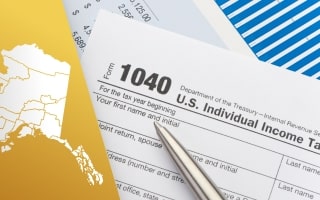Property Tax Records in Alaska

Buying a home in Alaska means that you'll need to pay taxes on the property. While tax rates can differ depending on the borough you live in, the state average is 1.17%, which is somewhat higher than the national average. While property taxes are higher in Alaska than in many other states, homeowners benefit from lower overall taxes. Understanding these tax implications is crucial for making informed financial decisions when purchasing a home in this unique state.
For example, the state doesn't collect income taxes. Residents also receive money every year from the state's "permanent fund". The purpose of this fund is to effectively offset some of the homeowner's property taxes.
You'll likely receive your annual property tax bill in June. You can choose to pay these taxes in full or in multiple installments. If you decide to make two separate payments, the first half will be due on June 30. You must pay the second half by the end of August.
Alaska property taxes are based on the tax rate in your area as well as the assessed value of your property. An increase in your property value will push your tax bill higher.
Throughout its somewhat short history, Alaska has always taxed real estate. However, taxation in the state changed considerably around a decade after it received statehood. At this time, the North Slope oil was discovered, which allowed the government to abolish the income tax. Alaska also made the first of its property tax exemptions in the early 1980s, which is when the homestead exemption for seniors was introduced.
Property Tax Assessment in Alaska

Property taxes are collected in Alaska at the local level, which means that boroughs and cities determine tax rates and assess property values. These tax revenues are typically used to pay for school districts and local government functions.
Your taxes are calculated based on your home's market value and assessed value. Every year, your home will be assigned a new value by the local assessor. However, they don't need to physically visit your property every year. While values can be updated once per year, assessors only need to visit homes once every five years.
Once the local assessor identifies your home's market value, they can calculate the assessed value and determine how much taxes you'll owe. Your home's assessed value should match its market value. Tax rates in Alaska are based on the amount of revenue that your local government requires for its annual budget. These rates are displayed as mills. One mill equals $1 in tax per $1,000 in a property's assessed value.
If your home has an assessed value of $300,000 and a mill rate of 30, your annual property taxes will amount to $9,000. A simpler way to make this calculation is by multiplying your home's market value by the effective tax rate in your area. If the effective tax rate is 1.10%, you'll pay $3,300 every year. The tax rates for the most populous Alaska boroughs and municipalities are:
- Anchorage Municipality: 1.41%
- Matanuska-Susitna Borough: 1.31%
- Fairbanks North Star Borough: 1.47%
- Kenai Peninsula Borough: 0.70%
- Juneau City and Borough: 0.98%
Calculate Alaska Taxes
It is wise to use a property tax calculator to better understand how property taxes are calculated in Alaska. This tool simplifies the process for both homeowners and real estate investors by allowing users to input key property details and estimate their tax assessment and annual liability based on local rates.
Since Alaska does not impose a statewide property tax, rates and assessments are determined at the local level by boroughs and municipalities. An Alaska property tax calculator can help you gain a clearer picture of your tax responsibilities and also identify potential exemptions or special tax relief programs, including the $150,000 Senior and Disabled Veteran Exemption and local residential exemptions of up to $50,000 off the assessed value in qualifying areas.
using our property tax calculator.
Alaska Property Tax Records: What Are They?

When you pay your annual Alaska property taxes, the local government will collect the money and use it to pay for a wide range of public services and governmental agencies. The specific services the revenues pay for depend on the items that are identified in the annual budget. Local school systems receive a large percentage of these funds.
If you are about to purchase a home in Alaska but want to learn more about it, consider accessing the local property tax records. These records are freely available to the public and are often provided on the local assessor's website. Once you enter a specific address or parcel ID, you'll receive a comprehensive report that includes information like the legal description and the most recent tax payments. The data that should be available in these reports includes:
-
Property location
-
Use code
-
Tax district
-
Zoning
-
Square footage of lot
-
Legal description
-
Owner name
-
Tax information from the past 10 years
-
Assessed value
-
Net taxable value
-
Exemption status
-
Land characteristics
-
Deed information
-
Stories
-
Year built
-
Condition and grade
-
Square feet of living area
-
Bedrooms and bathrooms
-
Other buildings and yard improvements
-
Building permits
-
Map of the area
-
Value history for the past seven years
Property Tax Exemptions and Deductions in Alaska

Alaska provides homeowners with a series of tax exemptions they can apply for. These Alaska tax exemptions might vary with each municipality. However, most municipalities provide the same tax breaks. If you seek an exemption on your property taxes, you must apply by March 15. Once you receive an exemption, you don't need to reapply every year. Below is an overview of a few of the most important Alaska tax exemptions:
Residential exemption: This exemption is available for most owner-occupied properties in Alaska. If you qualify, it can reduce your home's assessed value by 40% for a maximum amount of $75,000. Taking advantage of this exemption can significantly lower your property tax burden and enhance your overall affordability as a homeowner.
Senior Citizen Exemption: The Senior Citizen Exemption allows you to reduce your home's assessed value by $150,000 if you qualify, which can provide significant financial relief for eligible homeowners; however, to take advantage of this exemption, you must be at least 65 years old, and you'll also need to ensure that you live in the home and have full ownership of the property, as these requirements are crucial in determining your eligibility for this beneficial tax reduction. Given that property taxes can be a considerable expense for many homeowners, this exemption not only eases the financial burden but also serves as an important incentive for seniors who wish to remain in their homes, making it an invaluable resource for those who qualify and navigate the application process effectively.
Disabled Veteran Exemption: The Disabled Veteran Exemption also amounts to $150,000. The property must be your permanent place of residence. You can also qualify if you're a resident at the home who's at least 60 years old and the widow or widower of someone who was able to claim this exemption. Make sure you apply by March 15 if you're able to claim the tax break.
How To Search Property Tax Records in Alaska

There are several methods that you might use to gain access to the tax records of a property that interests you. Most boroughs in Alaska provide property information and tax records through an online database.
This database may be available through the municipality's website. Keep in mind, however, that the amount of information you receive from a records search can vary based on the borough you live in. The details might be lacking, which is why it's recommended that you consider a third-party source like PropertyChecker.
The PropertyChecker tool allows you to access homeowners name, extensive deed and tax records by entering the address of the property, its parcel ID. Their database includes information for around 155 million homes across more than 3,000 counties. Once you enter your search query, you'll receive the following documents and information:
-
Neighborhood info, which includes crime statistics
-
Property owner names
-
Deed records
-
Lengthy purchase history
-
Loan records, such as the lender's name and the amount of the loan
-
Lien records, which include the amount that's owed
-
Current market and assessed values
-
Details about the property, such as number of bedrooms, square footage, and lot size
-
Tax records
-
Foreclosure details
-
Building permit info
How To Appeal Property Taxes in Alaska

When you purchase a home in Alaska, you'll receive notices whenever your home's assessment value has changed. You should get the Alaska tax assessment notice for your property in the mail by late January.
Once you have this document, thoroughly review it to identify if your home's current assessed value is accurate. Appraisers can make mistakes, which is why the state allows homeowners to appeal if they believe that something in the document is incorrect. Here's a step-by-step guide that can help you appeal your home's assessed value.
Step 1: The first step of the appeals process involves filing a written appeal that specifies why you believe your home's assessed value is incorrect. A filing deposit must be paid at this time. The filing fee is anywhere from $30-$1,000, depending on the value of your home.
Once you receive your Alaska tax assessment notice, you'll have 30 days to file the appeal. Supporting evidence is due within 45 days.
Step 2: If you contact the assessor before the appeal deadline, they may be able to adjust the assessed value immediately. Otherwise, a formal appeal process must take place.
Step 3: If the appraiser doesn't change your home's assessed value after you provide the necessary evidence, you may need to attend a hearing at the Board of Equalization. You should receive a notice of the hearing at least two weeks before it occurs.
Step 4: You may not be satisfied with the Board's decision. If so, you can appeal it to the Superior Court. You must do so within 30 days following the Board's decision.
How Property Tax Records Impact Real Estate Transactions in Alaska

When you buy or sell a piece of real estate in Alaska, property taxes may be one of the first things on your mind. Since this is one of the only forms of taxation in Alaska, it can significantly impact real estate transactions throughout the state. The same is true for people who are investing in Alaska real estate.
The average property tax is 1.17%, which means that a buyer who wishes to purchase a $300,000 home will need to pay $3,510 per year. Most buyers choose to have their taxes separated into equal payments that are slotted into their mortgage dues. In this situation, a $3,510 tax bill leads to an increase in mortgage payments of nearly $300 per month.
A buyer may not be able to afford a home that they are interested in after they calculate the property taxes. Sellers who live in municipalities with high tax rates might find it difficult to attract buyers. If you're in this position, you can make your home more appealing by reducing the listing price or by offering multiple concessions during negotiations with a potential buyer.
For investors who want to purchase rentals in Alaska, they'll need to calculate how high their monthly mortgage payments will be after factoring in property taxes. Investors make most of their money by bringing in more funds than they spend every month, which is only feasible if they can maintain a positive cash flow. They commonly use property tax records to estimate their taxes and determine what rental price tenants should pay.
Investors throughout Alaska often purchase properties through tax foreclosure sales. If you own a home in Alaska, the due dates for your property taxes depend on where you live. In Homer, Alaska, the first installment of property taxes is due September 15th, while the second payment is due on November 15th.
If you fail to pay your property taxes on time, you'll receive a reminder bill of your outstanding balance by the end of November. These bills are due by the 15th of December. Delinquent bills are sent out the following January, after which you'll have one month to pay what you owe. The borough or municipality you live in can choose to foreclose on your property if you don't pay your delinquent taxes by February 15.
Some cities adhere to a three-year process, which means that they'll wait for a considerable amount of time to allow you to pay your outstanding taxes. Keep in mind, however, that fees and interest accumulate while the taxes remain unpaid.
If the city chooses to sell the home in a foreclosure sale, investors will have the opportunity to bid for the property at a public auction. Cities and boroughs hold these auctions once every year or two. In most cases, buyers have a year after the home is purchased to repay all their taxes and reclaim ownership.
Free Alaska Property Tax Lookup
Tax Records Please wait...
Property Tax Guide
- Property Tax Records in Alaska
- Property Tax Assessment in Alaska
- Alaska Property Tax Records: What Are They?
- Property Tax Exemptions and Deductions in Alaska
- How To Search Property Tax Records in Alaska
- How To Appeal Property Taxes in Alaska
- How Property Tax Records Impact Real Estate Transactions in Alaska
Instant Access to Alaska Property Records
- Owner(s)
- Deed Records
- Loans & Liens
- Values
- Taxes
- Building Permits
- Purchase History
- Property Details
- And More!
Free Alaska Property Tax Lookup
Tax Records Please wait...
Property Tax Guide
- Property Tax Records in Alaska
- Property Tax Assessment in Alaska
- Alaska Property Tax Records: What Are They?
- Property Tax Exemptions and Deductions in Alaska
- How To Search Property Tax Records in Alaska
- How To Appeal Property Taxes in Alaska
- How Property Tax Records Impact Real Estate Transactions in Alaska